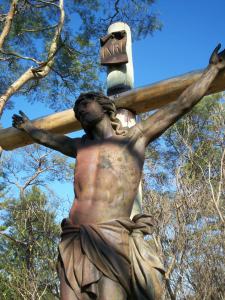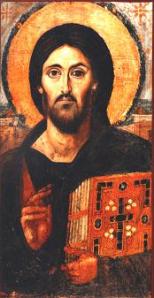The 16th century was a time of tremendous upheaval; numerous wars were being waged, and Europe was in great turmoil; it was the time of the Reformation, and numerous attacks were being levelled against the Church from outside. There were those, however, who moved deeper into their relationship with God to the point that they felt moved to act within the Church to correct abuses and bring the life of the faithful in general, and those in religious life in particular, back in line with what the Gospels and the Church’s teaching called them to. One of these ‘reformers from within’ was St. Teresa of Avila, a Spanish Carmelite nun who is recognized as one of only four female Doctors of the Church.
Some of her writings are among the greatest spiritual works of all time, and several are still among the best sellers lists. She had a deep desire to begin this ‘return to basics’ within her own religious order. However this movement to do away with excesses and return to deeper prayer and rid themselves of luxuries met with great resistance. At times it was only natural that in facing so much opposition St. Teresa wondered if it was really worth it, following where Jesus led. There was a story how at one point she was facing tremendous struggles and resistance and attacks; one of the sisters who supported her tried to encourage her; ‘Sister, ‘she said’ Don’t lose heart when facing these trials. These trials in the world are a sign that you are among God’s friends.’
To which St. Teresa is said to have replied, “Well, if this is how God treats his friends, it is no wonder he has so few of them.”
The Gospel of St. Matthew takes us on one of these journeys, where at one point we have the uplifting joy showered on someone close to God, and the next we have a cold hard dose of reality of what that closeness can mean in this world. Last week, we heard how Peter was graced with a revelation from God; that Jesus is the Christ, the Son of the Living God – and his proclaiming this truth is rewarded by Jesus with Peter’s primacy among the apostles; the rock upon which the Church is built.
Today, from the very next paragraphs in the same gospel, we have the same Peter going from the heights of praise by the Christ, to being chastised by Jesus, to the point of being compared with Satan; Peter, rash and proud, but who very much loves Jesus and desires to follow him; at one point, putting aside his own doubt and fear, boldly announces who Jesus is; he speaks a most profound truth – then in the next paragraphs, opens his mouth again and puts his foot in it! His faith journey is always two steps forward and one step back.
Jesus has just told the disciples that he must go to Jerusalem to suffer and to die – but he ends with a prediction of his own resurrection – the prediction contains the entire point of all of salvation history for the whole human race. And either Peter is so shocked by the first part of this prediction by Jesus; undergoing suffering and being killed – that he either doesn’t hear or he ignores the last part – that Jesus would, on the third day be raised. Whatever the reason, Peter jumps right in and starts spouting off what he thinks is wisdom and righteousness; he completely contradicts his previous statement that he believes Jesus is the Son of the Living God by applying his own human reasoning; that the Christ cannot suffer and die at the hands of his own people.
Jesus has just told the disciples what God’s plan is, and yet Peter’s first remark is ‘God forbid it!’ as if Peter knows better than God. Perhaps Peter’s response is not so much from a desire to protect Jesus, as it is fear of what might be expected of him now as a disciple; because Jesus follows his scolding of Peter with the definition of the true disciple; that anyone who would be his disciple must pick up their cross daily and follow Him. The disciples and those hearing these words from Jesus knew very well the reality of what ‘picking up the cross’ meant on the physical level. It was not simply a means of a quick death – it was a slow lengthy process, and was meant to not only kill the offender, but to completely destroy their dignity, to completely humiliate them and to serve as a warning to others. Carrying the cross was a very graphic example for Jesus to use. But it was a stark example of the extent to which His disciples are expected to go.
It doesn’t sound very much like discipleship is terribly appealing; but Jesus is telling the disciples – all of his disciples – that they don’t get a ‘free pass’ when it comes to the human condition simply by calling themselves his followers. Rather, it means embracing our human condition – all of it; the weaknesses and strengths, the joys and sorrows, the sufferings and the victories – and in whatever circumstances we find ourselves in, never losing sight of the fact that God, in the person of Jesus, despite his divinity, fully embraced our human condition and fully lived the whole range of our experience. He did that so we could share his nature…and he invites us to embrace His nature while not denying our own.
Discipleship doesn’t mean always having the easy path, or even the enjoyable path; it means detaching ourselves from those things that prevent us from growing closer to God; moving away from those things and circumstances that prevent us from truly loving God, and truly loving our neighbour –of emptying ourselves so that we might be filled more with God’s love and goodness and grace. And that is never easy.
The beauty of these chapters in St. Matthew is where they go from here; from Peter’s announcing that Jesus is the Son of the Living God; to Peter stumbling and trying to substitute human reasoning for God’s will; to what will come in the next chapter of the same Gospel – Jesus will take Peter, (along with James and John) up Mt. Tabor to reveal himself in his transfigured glory, giving them a preview of what is in store for all of those who return to God; who enter into eternity as adopted sons and daughters of the Almighty. Who are friends of God. It is a message to all of us to keep trusting in Jesus, no matter what this world brings our way.
It is a message that reflects our own faith journeys; that when we open our hearts, God will speak to us, revealing who Jesus is to each of us – that sometimes the road that we journey on will be difficult, and may even seem illogical or unwise using strictly human reasoning – but if we continue to get up despite stumbling and follow where Jesus leads us, we will join Him in his glory.
And in that regard, it is always good to be counted among God’s friends, even if sometimes it seems that there are so few of them.
Praised be Jesus Christ, now and forever!





